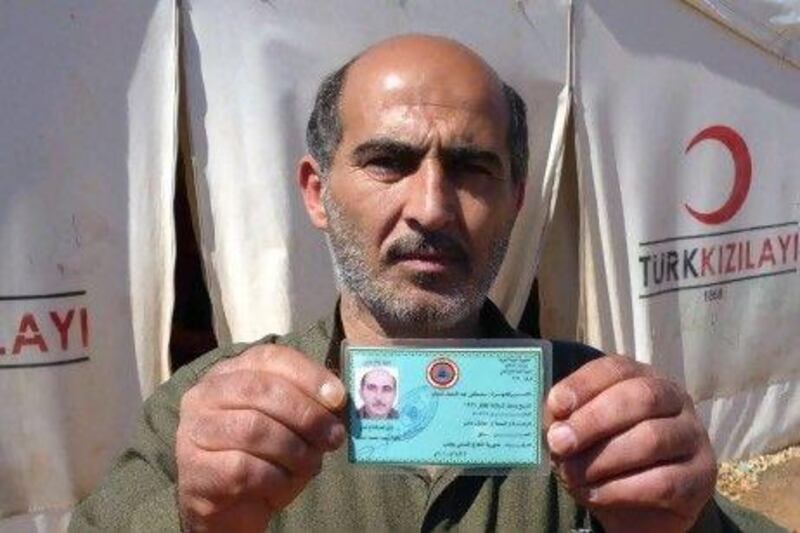REYHANLI, TURKEY // In the middle of a Syrian army operation in the province of Idlib, Mustafa Abdilhamit Shaban, a member of Bashar Al Assad's security forces, decided he could not take it any more.
"I was the driver of a military ambulance, but I fled," Mr Shaban said.
After he quit his unit last week, Mr Shaban, 50, fled west and ended up in a refugee camp outside the Turkish town of Reyhanli, close to the Syrian border.
Waving his laminated Syrian identity card, Mr Shaban, a Sunni, said he deserted because he was no longer willing to watch government troops committing atrocities against Sunni villagers. "Only the Alawites remain untouched," he said.
Mr Shaban said there were many soldiers like him in the Syrian security forces, as the violent repression of anti-government protests meets growing resistance by armed opposition groups.
Gun battles erupted this week for the first time in an upmarket part of the Syrian capital, Damascus, in a show of force by opposition fighters.
"Ninety-nine per cent of soldiers want to flee, but they stay out of fear," Mr Shaban said. Some decide not to break ranks because the anti-Assad fighters are outgunned by the Syrian regular army. "The opposition doesn't have a lot of guns," Mr Shaban said.
His statements cannot be verified, but they match accounts of other defectors who have fled the Syrian army and crossed the border into Turkey, where about 16,000 Syrians live in refugee camps. Many deserters, fearing reprisals, take their families with them.
According to refugees in the Reyhanli camp, some Syrian soldiers and their relatives are smuggled out of the country and into Turkey by men who know the border region well and enter Syria from Turkey regularly to get people out.
One man in the Reyhanli camp said he had led four Syrian officers across the border not long ago. "All in all, I have brought 240 people out," he said. "My last tour into Syria was four days ago."
The man said he could bring refugees over the border on foot by day in a journey lasting several hours, because he could coordinate his route with informants in Syria and because he knew paths that were not under observation by the Syrian army.
"Down in Guveccikoy, it's become difficult because there are many soldiers," he said. Guveccikoy is a Turkish border village about 80 kilometres south of Reyhanli and was the focus of Syrians trying to flee their country in a first phase of fighting last year. "But up here, it's OK."
Nine Syrian generals are among the defectors who have made it into Turkey, together with other officers and lower-rank soldiers. Many have joined the Free Syrian Army (FSA), an opposition force fighting the Assad regime inside Syria. Turkish authorities shield higher-rank deserters from the public eye, because they fear for their safety.
Syrian generals who have joined the opposition and other FSA officials this week renewed calls for outside intervention to force Mr Al Assad from power.
Ammar Alwavi, a military captain and spokesman for the FSA, told the Turkish news channel CNN-Turk that all avenues for a non-military solution to the crisis in Syria had been tried and failed. "We want to be given weapons," he said. Defections had resulted in the FSA reaching a strength of "50,000 to 60,000 well disciplined and well trained men".
Turkey has so far rejected the idea of arming the rebels, but an Arab diplomat said last week that Saudi Arabia was delivering military equipment to anti-government forces through Jordan.
FSA officials and refugees also call for an internationally controlled buffer zone inside Syria, arguing that the protection offered by such a zone would encourage many more Syrian soldiers to leave the army, weakening the regime and opening the way for the resignation of Mr Al Assad.
"With a buffer zone, everything would be easy," Mr Shaban said. He said he was willing to join the FSA. "All of us here would join up if we only had guns," he said, and other refugees agreed enthusiastically. "No diplomatic solution is possible any more," Mr Shaban said. And as for Mr Al Assad, "with that man, peace is impossible."





